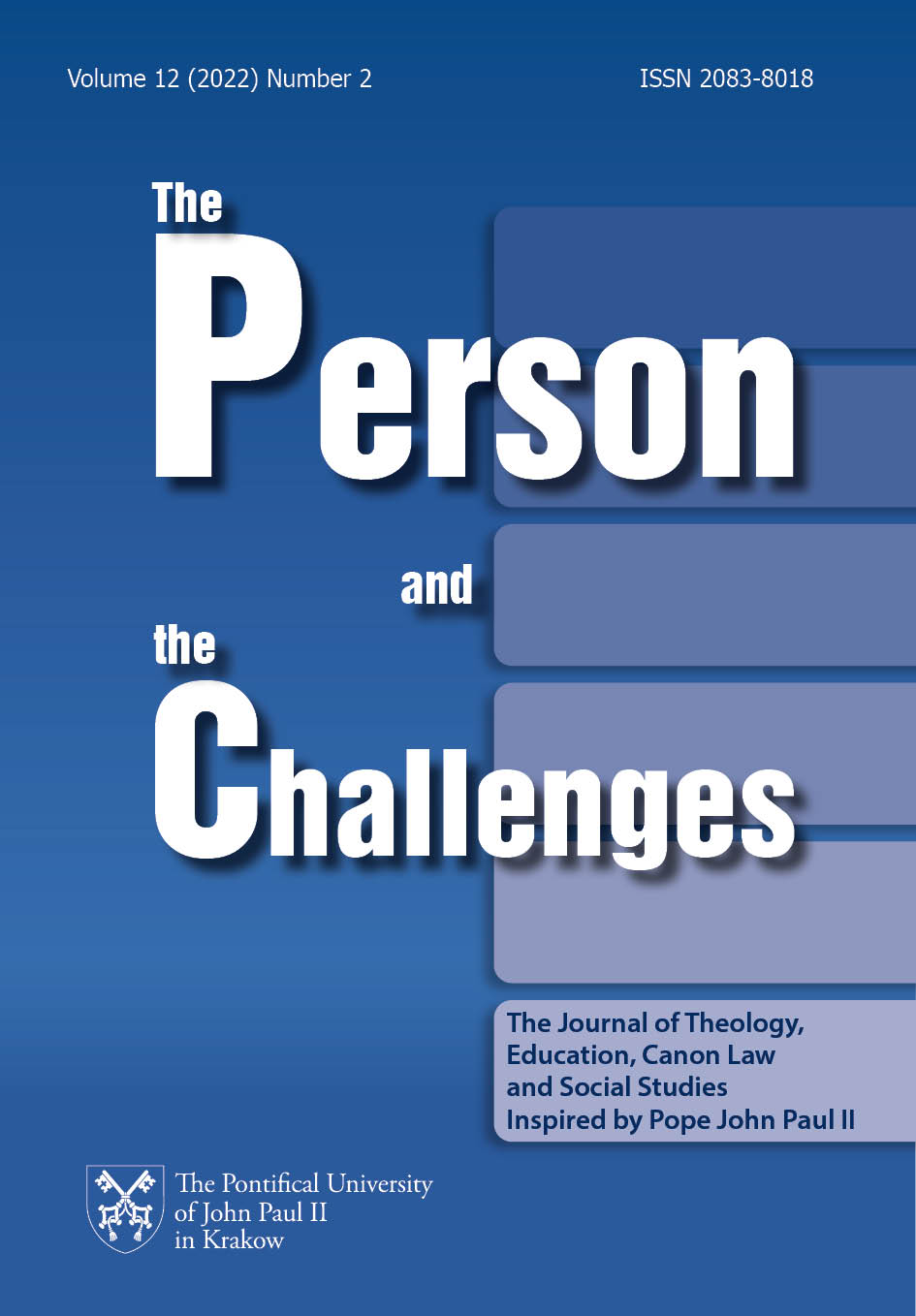The vision of a united Europe and Poland’s place and role in it in the light of St. John Paul II’s teaching
DOI:
https://doi.org/10.15633/pch.12203Słowa kluczowe:
Church, John Paul II, Europe, fatherland, nation, unity, community, Christianity, culture, traditionAbstrakt
The entire history of Europe and the awareness of a common identity formed in its course are clearly and deeply marked by Christianity and indicate a close relationship between the Church and Europe. Both in the West and in the East, the Church desires to contribute to the European Union. It feels responsible for the shape of the Old Continent and is convinced that it can also make an important contribution to the establishment of new institutional forms.
In the age of pluralism and respect for all religious beliefs it is unacceptable that a tendency to discriminate against any religion should come to the fore. Since the European Union engages in dialogue with political parties, trade unions and representatives of various religions, it would be incomprehensible if the same attitude was not displayed towards Christianity.
Above all, one must not ignore the transcendent dimension possessed by each human being. Indifference to this dimension may lead to tragic consequences and the European continent has seen plenty of those painful examples throughout its history. From the beginning of his pontificate, John Paul II expressed a great interest in European affairs. He showed Europeans a vision of unity in diversity, creative fidelity to Christian origins, in freedom, truth and solidarity.
Bibliografia
Benedykt XVI, Address Of His Holiness Benedict XVI to the Participants in the Convention Organized by the Commission Of The Bishops’ Conferences of The European Community (COMECE), 24 March 2007, “L’Osservatore Romano” (wydanie polskie), 28 (2007), nr 6 (294), p. 34. [English translation, available at: http://www.vatican.va/content/benedict-xvi/en/speeches/2007/march/documents/hf_ben-xvi_spe_20070324_comece.html] (14.03.2021).
Dziwisz S., John Paul II – a patron saint of Europe?, http://archiwalna.diecezja.pl/biskupi/kard-stanislaw-dziwisz/wystapienia/swiety-jan-pawelii-patronem-europy.html (7.01.2019).
Dziwisz S., Speech at the Conference ‘From the Treaties of Rome to the Constitutional Treaty’, Przegorzały 14 September 2007. http://archiwalna.diecezja.pl/biskupi/kardstanislaw-dziwisz/wystapienia/konferencja-od-traktatow-rzymskich-do-raktatueuropejskiego-przegrzaly-14-ix-2007.html (8.01.2019).
Dziwisz S., The Present Contribution of Christians to European Integration, The Final Statement of the First Special Assembly for Europe: So that we might be witnesses of Christ who has set us free, “L’Osservatore Romano” (wydanie polskie), 13 (1992), nr 1 (139), p. 49. [English translation: summary available at: http://www.synod.va/content/synod/en/synodal_assemblies/1991---special-assembly-for-europe--so-thatwe-might-be-witnesse.html] (12.03.2021).
Góralski W.M., European Integration: Concept, Essence, Doctrine, in: Unia Europejska. T. II: Gospodarka – Polityka – Współpraca, Warszawa 2007, pp. 20–29.
Górny G., Jan Paweł II: John Paul II: Europe Needs Poland, “Przewodnik Katolicki” (2003) nr 25, pp. 7–8.
Jan Paweł II, Address of John Paul II to the Commission of Episcopates of the European Union (COMECE), 30 March 2001, “L’Osservatore Romano” (wydanie polskie), 22 (2001), nr 5 (233), p. 29. [English translation: available at: http://www.vatican.va/content/john-paul-ii/en/speeches/2001/march/documents/hf_jp-ii_spe_20010330_comece.html] (3. 04.2021).
John Paul II, Angelus, 24 August 2003, Jan Paweł II, Rola instytucji europejskich, “L’Osservatore Romano” (wydanie polskie), 24 (2003), nr 11–12 (258), p. 38. [English translation: available at: http://www.vatican.va/content/john-paul-ii/en/angelus/2003/documents/hf_jp-ii_ang_20030824.html] (23.05.2021).
John Paul II, Homily in Gniezno, 3 June 1997, Jan Paweł II, Pielgrzymki do Ojczyzny: 1979, 1983, 1987, 1991, 1995, 1997, 1999. Przemówienia, homilie, Kraków 1999, p. 911. [English translation: available at: http://www.vatican.va/content/john-paul-ii/en/homilies/1997/documents/hf_jp-ii_hom_19970603_gniezno.html] (12.04.2021).
John Paul II, Post-Synodal Apostolic Exhortation Ecclesia in Europa of His Holiness Pope John Paul II, 2003, Watykan 2003, nr 108. English translation available at: http://www.vatican.va/content/john-paul-ii/en/apost_exhortations/documents/hf_jp-ii_exh_20030628_ecclesia-in-europa.html] (15.05.20210).
John Paul II, 1000 – year Anniversary of the Death of St Adalbert, Homily of John Paul II, Gniezno, 3 June 1997 [English translation: available at: http://www.vatican.va/content/john-paul-ii/en/homilies/1997/documents/hf_jp-ii_hom_19970603_gniezno.html] 31.03.2021).
John Paul II, What Freedom? What Europe?, “L’Osservatore Romano” (wydanie polskie), 12 (1991), nr 6 (133), pp. 7–8.
Juros H., Pro-European Vision of John Paul II: the Place of the Church in a Unified Europe, in: Ziarno czynu. Refleksje po V pielgrzymce Jana Pawła II do Ojczyzny, Kraków 1998, pp. 155–168.
Krucina J., The Common Good: Theory and Its Application, Wrocław 1972.
Lestienne B., Change in the Relationships between the European Union and the Southern Countries, in: Chrześcijaństwo a integracja europejska, (oprac. J. Sweeney, J. Van Gerwen), Kraków 1997, pp. 219–223.
Ritter C., Ethics as the Pope’s Power: John Paul II’s vision of a unified Europe, “Ethos” (2002), nr 57–58, pp. 134–142.
Rougemont de D., Open Letter to the Europeans, przeł. A. Olędzka-Frybesowa, Warszawa 1995, pp. 41–46.
Sławek T., Daily Eternity, “Tygodnik Powszechny” (2004) nr 11, p. 1.
Wawdejuk A., Europe of Homelands vs Europe of Regions, http://www.twojaeuropa.pl/466/teorie-integracji-cz-i-europa-ojczyzn-a-europa-regionow (9.01.2019).
Zenderowski R., What is Europe? Who are Europeans?, in: S. Sowiński, R. Zenderowicz, Europa drogą Kościoła. Jan Paweł II o Europie i europejskości, Wrocław–Warszawa–Kraków 2003, pp. 10–21.
Życiński J., The roots of new unity, in: Polska i Kościół w procesie integracji europejskiej, (ed. J. Piasecka), Warszawa 1998.
Pobrania
Opublikowane
Numer
Dział
Licencja
Prawa autorskie (c) 2022 Tadeusz Borutka

Utwór dostępny jest na licencji Creative Commons Uznanie autorstwa 4.0 Międzynarodowe.
Autorzy publikujący w czasopiśmie udzielają jego wydawcy zgody o następującej treści:
- Autor zachowuje autorskie prawa majątkowe do utworu, a jednocześnie udziela wydawcy czasopisma zgody na jego pierwszą publikację w wersji drukowanej i wersji online na licencji Creative Commons Uznanie autorstwa 4.0 Międzynarodowe oraz zgody na wykonywanie opracowań, w tym przekładów.
- Autor ma możliwość udzielania zgody niewyłącznej na opublikowanie utworu w wersji, która ukazała się w czasopiśmie (np. zamieszczenia go w repozytorium instytucjonalnym lub opublikowania w książce), wraz z informacją o jego pierwszej publikacji w czasopiśmie.
- Autor może umieścić swój utwór online (np. w repozytorium instytucjonalnym lub na swojej stronie internetowej) jeszcze przed zgłoszeniem utworu do czasopisma.

